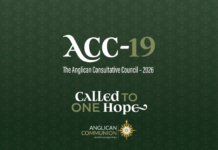In a series of BBC interviews, Bishop Robert [Innes] has reflected on Brexit developments during 2019, and looked ahead to 2020.
Bishop Robert noted most people in the Diocese were “sad and disappointed” about Brexit.
The 2016 referendum had been an “unnecessary binary choice” on the issue of EU membership that had polarised the country. “I have British and European identities, and it seems Brexit is forcing me to choose when I want to keep both” he added.
There was now at least, some more certainty on Brexit, following the limbo of the past three-and-a-half years. The next year would be decisive in shaping and re-imagining the UK’s future relationships both with the EU and globally, the Bishop said, and he cautioned that “getting a Withdrawal Agreement in place is the first step in what Boris Johnson calls “getting Brexit done”.”
The real challenge lay ahead with intensive trade negotiations in 2020. “A year from now, we don’t know whether the UK will stay aligned with EU regulations in a close trading relationship, or if we shall set sail for the high seas” the Bishop opined. It would therefore be important to continue to hold the new UK Government to account and scrutinise the detail of the negotiations.
Bishop Robert stressed “we have to avoid a Brexit in which the losers are the poorest and weakest in our society.”
The Bishop was asked about how people in the Diocese were now preparing for Brexit. He responded that many were asking “should I stay, or should I go?” or if they had decided to stay, how they could legally exercise a right to remain in an EU27 country after Brexit. Bishop Robert noted the Diocese was working closely with agencies on the ground in order to start supporting isolated, elderly people with preparing residency applications, especially in Spain and France.
The Bishop also drew attention to other issues of concern for the Diocese, in addition to citizens’ rights. These included the ongoing ability to appoint and move clergy around Europe and future data transfer and sharing across borders.
Bishop Robert said while there were some administrative issues being experienced, away from the politics of Brexit, local responses among people in the EU member states continued to be generous, even if local people in the EU27 Member States really struggled to understand Brexit. Bishop Robert cited remarks in the open letter written last week by Frans Timmermans, Executive Vice-President of the European Commission, as a typical example of warmth across Europe for the UK. You can read the Commissioner’s letter here: https://www.theguardian.com/commentisfree/2019/dec/26/my-love-letter-to-britain-family-ties
Bishop Robert emphasised the need for reconciliation and healing. He recalled the “gift and treasure” of peace in Europe for 75 years, commemorated in D-Day events this year. He also noted it had been 30 years since the fall of the Berlin Wall in 1989. Both D-Day and the collapse of the Berlin Wall were examples of “strong and timeless messages about our struggles together for freedom from oppression.” The Bishop said he would meet with our ecumenical partners shortly after Brexit day to reaffirm the Anglican presence across Europe and develop further co-operation post-Brexit, reiterating that “the Church of England has been in Europe long before the EU had been created.”
He also welcomed current twinning links and arrangements between English churches and chaplaincies in the Diocese in Europe, and encouraged more work to foster and deepen such relationships.
Bishop Robert offered reassurance on dealing with the divisiveness and rancour of human relationships due to Brexit, within families and among communities:
“Christmas time reminds us of the Gospel message of the angels and shepherds bringing peace on earth to those with whom God is pleased,” Bishop Robert told listeners across the country.
He continued:
“There is more to life than Brexit. We have our faith and families that sustain, nurture and feed us through difficult times. We should keep a sense of perspective and take Brexit a month at a time as a great deal will happen over the next year to shape our relationships with Europe. Let’s encourage one another through it.”
Bishop Robert emphasised also the scale of climate change, environmental degradation and global warming as challenges for the next decade.
Bishop Robert gave interviews across BBC radio stations in England and the Channel Islands on Sunday. You can listen to his interviews with BBC Radio Coventry & Warwickshire and BBC Radio Jersey & Guernsey at the links below:
Coventry/Warwickshire: timeline 2:22-2:27 https://www.bbc.co.uk/sounds/play/p07xmp4d
Jersey & Guernsey: timeline 1:39-1:44 https://www.bbc.co.uk/sounds/play/p07wwb6z




There were times during the reign of the Plantagenet kings England controlled half of what is France today. Maybe they will once again. What we can be sure of is the EU in Brussels screwed up royally. Did the bureaucrats really need to regulate how much paper you can use in one sitting?
‘You can listen to his interviews with BBC Radio Coventry & Warwickshire and BBC Radio Jersey & Guernsey at the links below…’
Thanks all the same but, from what I’ve just read, I’d rather go for a two hour session of root canal treatment.
And not a single word from any of them about the most consequential and disruptively catastrophic event of our time: the demographic replacement of Europe and North America. The Christian churches have turned Judas against their nations. If that’s “the Gospel” in action, screw it.
For ordinary people, whether to stay in the EU or leave is a binary choice that most can understand. Imagine if the referendum had contained twenty questions (at least) to deal with various possibilities for action, or one yes or no question with a preamble two pages long. Another binary question is whether bishops should be commenting publicly, in their role as bishop, about controversial political issues that have no clearly-defined moral dimension, such as marriage or abortion.